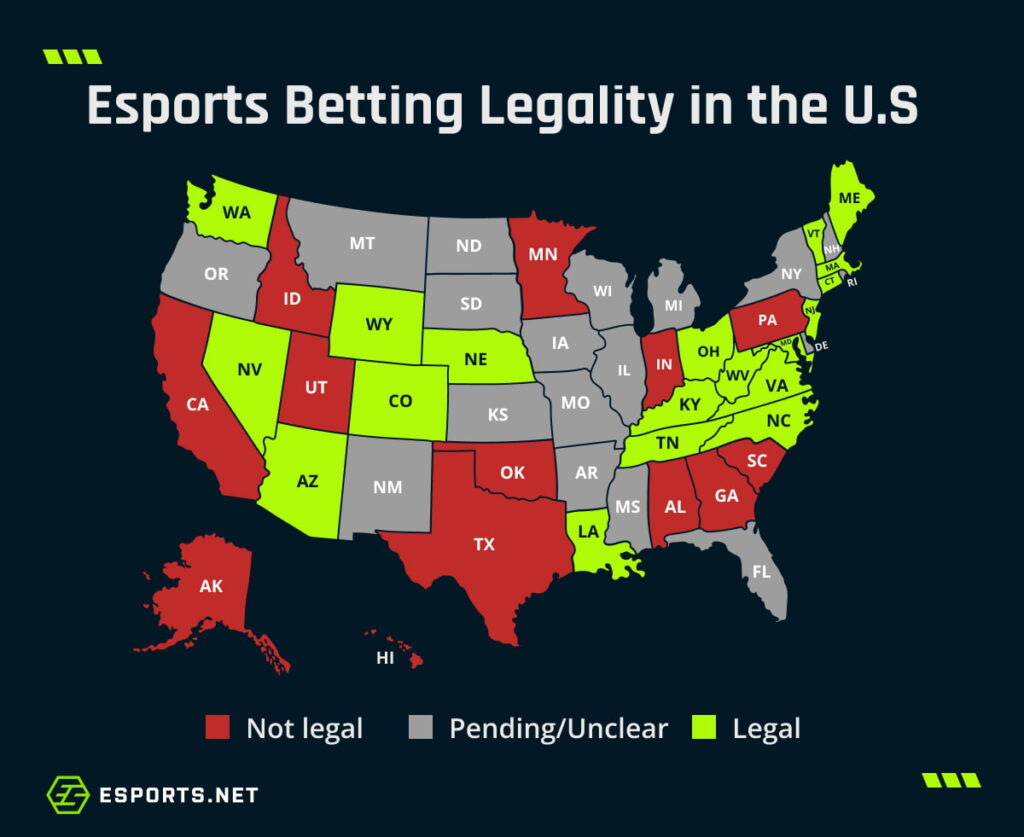Is esports betting legal in the U.S.? Full 2025 State-by-State Guide
- Esports is positively booming in the U.S., fueled by competitive gaming titles including League of Legends, CS2, and VALORANT.
- Esports betting is legal in certain parts of the U.S., but regulations vary from state to state, with only around 19 states currently allowing it under specific laws.
- The legal status of esports betting in the U.S. is regulated at the state level, so esports bettors must always check local legislation before wagering.
Esports has undeniably taken the world by storm, and the U.S. is certainly no exception. However, since every state has its own individual gambling laws, knowing which states allow esports betting can be very confusing.
In a bid to help you out, we’ve created an easy-to-follow guide that outlines where esports betting is permitted, while also covering everything you need to know before you place your esports wager.

Is Esports Betting Legal in the U.S.?
Esports betting is definitely legal in some parts of the United States, but its availability is not nationwide… at least not yet.
As of 2025, 19 U.S. states have legalized esports betting, whereas 13 other states have banned it outright. However, there are a further 18 other states that have yet to fully clarify the definition of esports wagering, meaning competitive gaming sits within a legal gray area where regulations remain unclear.
Legalization actually began back in 2018, following the landmark federal repeal of PASPA, which handed back the right for individual states to regulate their sports wagering legislation independently. Since then, esports has truly emerged as a new brand of legitimate competitive sports, ultimately paving the way for state-level legislation to include the format under its own existing sports betting laws.
Nevertheless, while some states such as Nevada, New Jersey, and Colorado have openly embraced betting on esports with clear and definitive frameworks, many others remain cautious. Of this handful of holdout states, some express concerns about the integrity of competitive gaming, while other states, like California and Texas, simply prohibit any form of sports gambling.

Esports Betting Legality — State-by-State Breakdown
When answering the question ‘is esports betting legal in the USA’, and if it is, ‘what states is online sports betting legal’, the answer essentially varies all across the country.
So to help you out before you start wagering on the best U.S. esports betting sites, here’s a full breakdown of the legal status in all fifty states, including the relevant bill numbers and minimum age requirements to do so.
| US State | Legal Status | Explanation |
|---|---|---|
| Alabama | ❌ | Alabama does not permit gambling on sports events in any form, which means that, at present, it is illegal for residents to place any sort of wager, whether it is on traditional sports or esports gaming purposes. |
| Alaska | ❌ | Currently, Alaskans cannot legally place bets on sports, nor can they engage in esports wagering, as all forms of sports wagering remain banned. |
| Arizona | ✅ | Under SB1797, Arizona now permits betting on esports to anyone over 21 years of age, as it recognizes esports as a type of sports event, giving regulated sportsbooks the authority to legally facilitate these bets. |
| Arkansas | ⚠️ | Arkansas has legalized wagering on sports, but esports wagers are not explicitly included in the state’s legal gambling framework, leaving it within a legal gray area. |
| California | ❌ | Like with sports betting, the legal status of esports wagering remains totally illegal, meaning that Californians cannot legally bet on esports competitions and events at this time. |
| Colorado | ✅ | For those over 21 years old, betting on esports is legal under HB1327 in Colorado, with numerous sportsbooks offering these wagers, although bets on some high school competitions remain outlawed. |
| Connecticut | ✅ | Under HB6451, esports wagering is permitted in Connecticut as part of broader sports wagering legalization, but bettors must be over 21, and certain college-level events remain ineligible if they do not satisfy the law’s requirements. |
| Delaware | ⚠️ | While traditional betting on sports is legal in Delaware, esports wagering remains prohibited, and it is not specifically included under the state’s gambling on sport regulations yet. |
| Florida | ⚠️ | Betting on esports continues to remain unregulated in Florida, with the Sunshine State only allowing certain types of conventional sports bets as things stand. |
| Georgia | ❌ | Betting remains unlawful in the state of Georgia, leaving no legal avenue for wagering on any competitive esports events and tournaments at the moment. |
| Hawaii | ❌ | As of now, Hawaiians cannot legally bet on sports or esports, although new proactive legislative directives may soon open the door to legal wagering in the future. |
| Idaho | ❌ | Idaho continues to prohibit betting on sports and esports, which means its citizens have no legal option for wagering on any esports events. |
| Illinois | ⚠️ | Illinois has yet to authorize betting on esports, leaving competitive gaming on the fringes of the state’s existing legal gambling laws for now, although this could change with future legislation. |
| Indiana | ❌ | Despite Indiana permitting betting on sports, esports betting still remains illegal, with specific laws explicitly banning wagering activities on all esports events. |
| Iowa | ⚠️ | While esports wagering continues to sit outside the scope of Iowa’s legal gambling on sports events – meaning that although sports bets are allowed – it would appear that esports cannot be legally wagered on at present. |
| Kansas | ⚠️ | Under current Kansas law, SB84 appears to omit esports from the legal statute, which means that although sports wagering is allowed, it does not include provisions for betting on competitive gaming events. |
| Kentucky | ✅ | Under KR230.808, betting is permitted in Kentucky, allowing regulated sportsbook platforms to take bets on approved esports tournaments as ratified by the Kentucky Racing Commission, and uniquely, you can do so as long as you are over 18 years old. |
| Louisiana | ✅ | Louisiana legalized wagering for individuals aged 21 and over on competitive video gaming through its SB247 legislation, which enables approved bookmakers to offer betting markets on certain esports tournaments. |
| Maine | ✅ | Betting on esports is effectively legal in Maine, as LD585 allows wagering on “virtual sports competitions,” which essentially encompasses wagering on league events and tournaments if you are 21 or older. |
| Maryland | ✅ | Esports betting is currently legal in Maryland as long as you are over 21, but the proposed SB1033 bill currently being discussed may soon ban online sports gambling statewide if passed. |
| Massachusetts | ✅ | Wagering on esports is permitted in Massachusetts for any competitive video game event as long as it is approved by the Massachusetts Gaming Commission, and bettors are 21 or older. |
| Michigan | ⚠️ | Although Michigan legislators allow legal betting on sports events, the existing framework does not explicitly mention esports, leaving wagering on esports outside the current legal scope and in an ambiguous gray area. |
| Minnesota | ❌ | Both esports and traditional wagering on sports remain illegal and unauthorized under Minnesota law, despite repeated attempts by lawmakers to introduce legislation that would allow regulated wagering. |
| Mississippi | ⚠️ | Mississippi is another state that has legalized sports wagering, but has failed to specifically address esports directly, meaning that technically, wagering on competitive esports is not currently permitted. |
| Missouri | ⚠️ | Missouri currently bans betting on sports, but recent legislation under consideration could soon make it legal, potentially paving the way for regulated esports wagering too. |
| Montana | ⚠️ | Esports betting is not yet legally recognized in Montana, but lawmakers may soon expand the existing framework for sports gambling to include wagering on competitive gaming. |
| Nebraska | ✅ | Under LB561, Nebraskans can legally bet on sports, including esports, which is now classified as a valid sporting event for the purposes of betting, and open to residents over 21 years old. |
| Nevada | ✅ | Nevada’s SB240 legalized gambling on sports events on multiple event types, including esports, for anyone aged 21 and over, which also led to the foundation of the Esports Advisory Committee, designed to legislate over esports wagering and related gambling activities in the state. |
| New Hampshire | ⚠️ | As things stand, wagering on esports is not currently permitted in New Hampshire, despite the state allowing sports wagering. However, there are suggestions that this may soon expand to include esports bets. |
| New Jersey | ✅ | Esports wagering is indeed legal in New Jersey under A637; Nevertheless, the statute expressly prohibits betting on esports competitions that involve high school or underage players, and bettors must be at least 21. |
| New Mexico | ⚠️ | In New Mexico, full legalization of betting on sports has not yet materialized, which means esports also remains in limbo as to whether it is prohibited or not. |
| New York | ⚠️ | Similar to some other states, esports wagering is not clearly defined under New York law, meaning that despite the state’s robust sports wagering framework, wagering on esports remains effectively unregulated and illegal. |
| North Carolina | ✅ | If you are 21 or older, betting on esports became legal in North Carolina with the passage of HB347, which directly incorporated electronic sports into the state’s definition of regulated sports events. |
| North Dakota | ⚠️ | While citizens of North Dakota have limited access to traditional sports gambling, the presence of esports wagering at some tribal casinos suggests that regulated online esports betting may be possible in the future. |
| Ohio | ✅ | Esports are currently integrated in Ohio’s legal sports betting framework through HB29, with the only caveats being the additional protections that are in place to prevent betting on underage competitors, and gamblers must be at least 21. |
| Oklahoma | ❌ | Esports and traditional sports wagering remain illegal in Oklahoma, with no set legislation currently permitting regulated betting on either sporting format. |
| Oregon | ⚠️ | Betting on esports is not yet directly addressed in existing Oregon laws, although Beaver State residents are still allowed to legally place wagers on traditional sporting competitions. |
| Pennsylvania | ❌ | The current legal status of esports betting in Pennsylvania does not allow for any form of wagering on competitive gaming, having been specifically sidelined outside the state’s existing legal sports gambling framework. |
| Rhode Island | ⚠️ | While Rhode Island has a legal framework that already permits regulated gambling on sports events, electronic sports are not included in the legislation, leaving any bets on esports outside the bounds of the law. |
| South Carolina | ❌ | In South Carolina, residents cannot legally bet on traditional sports or esports at the moment, nor are there any immediate plans to alter this legal standing on sports wagering in general. |
| South Dakota | ⚠️ | While betting on sporting events is permitted in South Dakota, the law does not specifically cover esports, meaning wagers on esports events aren’t theoretically allowed. |
| Tennessee | ✅ | Esports wagering was first made legal in Tennessee following its 2019 sports betting legislation, which saw the Volunteer State become one of the first states to expand the definition of regulated sports events to include competitive gaming, and is open to anyone over 21 years old. |
| Texas | ❌ | The legal status of esports betting, and traditional sports wagering for that matter, remains strictly prohibited, as all forms of sports wagering are banned in the Lone Star State. |
| Utah | ❌ | Utah currently outlaws all forms of gambling on sports, including esports wagering, leaving its residents with no legal outlet to be able to place bets on any competitive sporting events. |
| Vermont | ✅ | In Vermont, regulated betting platforms can legally accept wagers on esports events that have been granted official authorization under the state’s Sports Wagering Procedures, and bettors must be at least 21 years old. |
| Virginia | ✅ | Esports are effectively covered under Virginia’s SB384, which introduced legal sports wagering and incorporated electronic sports for anyone older than 21 in the state. |
| Washington | ✅ | Under HB2638, Washington residents aged 21 and over can legally bet on both traditional sports and esports, as they also officially recognise electronic sports as being eligible events for bettors to wager on. |
| West Virginia | ✅ | HB4826 officially kick-started betting in West Virginia for residents over 21 years of age, having made wagering on esports competitions and events openly accessible to bettors in the Mountain State. |
| Wisconsin | ⚠️ | Although Wisconsin bettors can legally place sports bets with authorized operators such as tribal casinos, esports wagering still isn’t covered under existing state law and remains prohibited to its citizens. |
| Wyoming | ✅ | Betting is available for anyone aged 21 and is officially covered by Wyoming’s legal sports wagering framework following the passing of HB133, which facilitates wagering on esports alongside other traditional sports. |
Legal Requirements to Bet on Esports in the U.S.
Now that you’ve identified if your state permits wagering on esports events, there are just a couple more pointers you need to ensure when you’re first learning how to bet on esports in the U.S. in order to avoid breaking the law.
However, just like the patchwork of states that approve betting on esports, these too can vary from state to state, and consist of checking:
Age Requirement
While most states require bettors to be at least 21 years old to bet, Kentucky is more flexible and currently allows anyone over the age of 18 to wager on esports. As a result of this, proof of age is mandatory when you first register and withdraw your winnings, which can be done by submitting a valid ID, such as your driver’s license or passport.
Licensed Betting Platforms
As with any form of betting in the U.S., you can only wager on your favorite esports event using a licensed state-regulated sportsbook site or mobile app. The advantages of this for you is it means that your funds are protected, your winnings will always be paid out, and your personal data remains secure.
Location Verification
This may seem like a no-brainer, but you must always check that you are physically located in a state where esports betting is legal. Fortunately, licensed sportsbooks can do this simply by using geolocation systems and location detection systems, which automatically confirm the spot from where you are placing your esports wager.
Tax Obligations
Another key factor you must be aware of is that any winnings from esports wagering are considered taxable income under federal law. Therefore, you should always keep a record of your betting activity, as you may be required to report these earnings on your annual tax return at the end of the tax year.
Conclusion
Whether you’re brand new to esports or you’ve been an avid fan for years, applying your skills and built-in knowledge when learning how to bet on esports has the power to take your enjoyment of competitive gaming to a whole new level.
With 19 states already permitting esports wagers and more currently considering possible legislation, the future of esports is thriving.
That being said, it’s always critical that before you place any esports bets, you must first check the legislative terms and conditions within your state. After all, understanding whether esports betting is legal in your region ultimately ensures you remain compliant while wagering on any esports tournaments and events.
Yet, just like general betting on sports events, it’s also vitally important to only bet using licensed operators in your state, as not only will this offer you the safeguards of keeping your wagering money protected, but you’ll also have access to their responsible gambling tools.
These mandated sportsbook facilities provide the perfect platform for you to not only gamble on esports safely, but they also allow you to monitor and maintain your bankroll with tools such as deposit limits and self-exclusion services.
FAQs
Is esports betting legal in the U.S.?
Yes, but only in a handful of states currently. While only 19 states have legalized esports betting so far, 13 have banned it entirely, while 18 others remain in a legal gray area, so where you live does matter.
Is esports betting federally legal in the U.S.?
As of 2025, esports wagering in the United States still lacks federal approval, resulting in the absence of a single national framework governing the practice. To date, state laws take priority, which is why it is important to always check your state’s regulations on esports betting before you start wagering.
Where is esports betting legal in the U.S.?
Esports betting is currently legal in the U.S. in Arizona, Colorado, Connecticut, Kentucky, Louisiana, Maine, Maryland, Massachusetts, Nebraska, Nevada, New Jersey, North Carolina, Ohio, Tennessee, Vermont, Virginia, Washington, West Virginia, and Wyoming.
References
- SB 1797 (Arizona State Legislature)
- Colorado House Bill 1327 (Prior Session Legislation) (LegiScan)
- Connecticut House Bill 6451 (Prior Session Legislation) (LegiScan)
- Sporting events that may be wagered upon – Restrictions – Procedure for sports governing body to request exclusion (Kentucky Legislative Research Commission)
- SB247 (Louisiana State Legislature)
- Summary of LD 585 (State of Maine Legislature)
- SB1033 (MARYLAND GENERAL ASSEMBLY)
- 205 CMR 247: UNIFORM STANDARDS OF SPORTS WAGERING (Massachusetts Gaming Commission)
- Nebraska Legislature – Legislative Document (Nebraska Legislature)
- Nevada Senate Bill 240 (Prior Session Legislation) (LegiScan)
- Esports Technical Advisory Committee (The Official State of Nevada Website)
- New Jersey Legislature (New Jersey Office of Legislative Services)
- Bill Summaries: H347 (2023-2024 Session) (UNC SCHOOL of GOVERNMENT)
- Gambling (Ohio Legislative Service Commission)
- HOUSE BILL NO. 1 (State of Tennessee)
- Sports Wagering Procedures (State of Vermont)
- Virginia Senate Bill 384 (Prior Session Legislation)(LegiScan)
- ENGROSSED SUBSTITUTE HOUSE BILL 2638 (State of Washington)
- WEST virginia legislature (West Virginia Legislature’s Office of Reference & Information.)
- Legislation – 2021 (STATE OF WYOMING)















